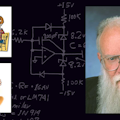This is part three of a six part series.
Let's jump right in and continue on with the Fuzzy Logic laundry list I started in the last issue.
20. F.L. is alleged to be "faster and easier to develop." That's what the F.L. guys like to claim. Again, I still don't really trust them. What would you expect them to say? Other engineers argue that the claimed ease and speed are not always there.
I am not in any position to prove this one way or the other, but you had best be on your toes, and insist on satisfactory comparisons. In other words, don't permit any straw men to be perpetuated. Or perpetrated.
Besides, even the proponents of F.L. admit that sometimes, tuning a F.L. system can take "hours or days of computer time...."9 In a similar vein, Haubold vom Berg10 cautions, "Be careful here, though: Applications for the possible use of fuzzy loops have to be carefully selected, and the degree of fuzzy control must be determined in advance. That's because a significant number of loops will not be optimized with a low-end fuzzy loop, and the instrumentation can be damaged."
Is it just possible that the optimization of F.L. controllers should not be left to the judgment of a technician with 15 minutes of training? Refer to the next paragraph....
21. F.L. guys claim that you do not have to be an expert to apply F.L. In fact, some of them say that any good technician can be taught in a few minutes to be an expert on Fuzzy-Logic controllers, replacing engineers with many months and years of schooling and experience.11 Sure, they can say that any time, but I don't have to believe it. I am certainly not going to take this technician and set him in charge of my Nuclear Reactors. (Did they use Fuzzy Logic at Chernobyl?) (That's supposed to be a joke....)
22. F.L. guys claim that it is easy to put in the correct F.L. coefficients. If a ferry boat is heading for the dock, all you have to say is, "If velocity = (medium) and distance = (medium), then keep negative RPMs = (medium) to maintain the necessary deceleration."
Conversely, if an expert wants to set up a conventional control system, he has to know that the number of RPMs must be K × (1 + V - (2 a x)1/2), where K = -860 rpm, with all parameters expressed in (feet) and (seconds). He has to be smart enough to know that K = -860, and not +860, or -86, -0.086, or -0.00086, or -460. But to make F.L. work, all you have to know is, to say "medium."
Well, don't look now, but if the conventional guy guesses wrong, at K = -86, and the ferry boat winds up perched on the dock, the F.L. guy can certainly make the same error, and HIS ferry boat will wind up on the dock, too. Hey, a factor of 10 error in either case will bring you to that same result. Fuzzy Logic computers are NOT clairvoyant. If you tell them to do the wrong thing, they will not just "do the right thing," they will do what you tell them. Magic is not an appropriate element to invoke, nor to depend on....
23. It is sometimes claimed that F.L. can "learn" how to get the right answer-this is supposed to be a big advantage. However, Fuzzy Logic by itself cannot "learn" anything. If you want to get the F.L. to "learn," you have to use adaptive F.L. (non-trivial) or use Neural Networks. The knowledgeable guys with NeuFuz4 showed me that if you use Neural Networks to find a solution, and set the Membership Function, and generate the rules, these rules may be non-heuristic, not at all the same old rules, but improved rules with new advantages. Sounds impressive. Call them for details.12
Still, if you want to run the F.L. in a learning mode, be aware that a F.L. controller may make a lot of mistakes as it learns. Again, this is not the place to let loose the F.L. controller on your brand-new Nuclear Reactor, or your new catalytic cracking plant, or your epoxy resin kilns. F.L. controllers can be coached to learn a task when you have saved up a lot of data on how the system runs. It can look at the input data and the output data, and figure out how to control the plant. BUT only if you have that data, for all relevant regimes of control.
If you have a nuclear reactor, and if you had a Fuzzy controller for all normal operating modes, you would NOT use F.L. to control the system in the case of a breakdown, emergency, blow-up, melt-down, loss of pressure, thermal run-away, or any other non-standard mode, because F.L. only works well when you have run your system in that mode, and have a lot of data on that mode. You don't want to engineer your control of emergencies that way.
24. Further, it is claimed that F.L. can adapt to changing systems—as if conventional controllers could not. But conventional controllers can operate with adaptive coefficients. You can take a conventional PID (Proportional-Integral-Derivative) controller, and add on adaptive or self-tuning procedures. If you know the Control System Industry, you would know that. If you didn't know that, you might be willing to give F.L. some credit for miraculous advantages, which are not new advantages at all.
25. Remember the old saying, "To a man with a hammer, everything looks like a nail." Well, if a person knows how to apply Fuzzy Logic, and he doesn't know any other way to do it, I should not tell him that he cannot do the task. However, he has no right to tell me that is the only way, or the best way, just because it is the only way he knows....
26. F.L. has been stated13 to be quite good at controlling the same kind of systems that people can, but with faster sampling, fewer mistakes, and more features. Anything you can do, slow as you are, a computer can do a little faster, better, and more consistently. Okay, that's not a silly statement: Anything I can do, that gets boring and repetitive, such as, starting and stopping a subway train smoothly and precisely, time after time, may be a good candidate for F.L. As far as I am concerned, that is arguably the best thing we can say about Fuzzy Logic.
27. Now, where are the cases where F.L. really is not suitable to do a good job? I suspect there are cases where the F.L. computing speed is not adequate, and maybe even a fast analog controller is necessary. Also, cases where timing, counting, integrating, and differentiating are required are not feasible unless you combine some F.L. and some conventional logic.
While we hate to be negative, it is important to be honest, because if there really are tasks that F.L. cannot do, we don't want to waste people's time on them. I think that F.L. people ought to make known, and publicize, cases where F.L. is really unsuitable, and, if possible, the reasons why. This is for the good of their industry.
28. Also, several people sent in reminders, that if you have a conventional controller, and it is working OK, there is usually not any advantage to throwing it out and replacing with a F.L. controller, despite all the HYPE to the contrary. Any case where F.L. is shown to provide a WONDERFUL advantage over a conventional control system, is either a case where the conventional controller was not at all optimized, or, the system was nonlinear so the conventional controller could not do well.
Lastly, let's look at a couple of specific examples about Fuzzy Logic.
29. By the way, nobody yet has recollected where the original magazine article was, that said that a Fuzzy Logic Controller could control a subway train smoothly, but a "conventional" digital controller would jerk, jerk, jerk, jerk... Does anybody recall seeing that-can you tell me where that was published? I did a search, but nothing turned up....
30. On American Public Radio,14 Daniel McNeill stated that the new 1993 Saturn has an improved automatic transmission, so that on steep upgrades, it uses F.L. to cut out surging, "hunting," and excessive shifting up and down.
WELL, the Saturn's transmission has been improved, and it does use Fuzzy Logic to provide automatic downshifts on downhills. But the transmission does NOT use F.L. to avoid "hunting" on upgrades.15 It uses conventional hysteresis. Fuzzy Logic is NOT needed to do that, and is NOT used for that.
31. Also, I have always been skeptical that F.L. can make a subway train run much more smoothly than a good conventional controller. In a recent magazine,16 Bart Kosko admits that the conventional train control system that was compared to Hitachi's F.L. controller, in Sendai, Japan, was pretty crude and jerky. "Conventional controllers start or stop a train by reacting to position markers that show how far the vehicle is from a station...the automated controller will apply the same brake pressure when a train is, say, 100 meters from a station, even if the train is going uphill or downhill."
Well, if the best competing "conventional" control system was so shoddily engineered, and was not intelligent enough, not adaptive enough, to apply the brakes differently, if the train was going fast or slow, uphill or down, empty or fully loaded, then of course the Fuzzy Logic system deserved to win, but only by default, not by inherent superiority. If nobody had the sense to move the "apply brakes" markers 130 meters out, on a down-hill, or 80 meters out, on an upgrade, then we are talking about relative levels of stupidity.
And Kosko observes, on the conventional controller, "because the controllers are rigidly programmed, the ride may be jerky..." Well, of course, a F.L. system can show advantages when compared to a system as crude as that, if nobody programmed the acceleration to feather off, to avoid dv2/dt2 = da/dt = "jerk." Also, I heard statements that during quiet times when human operators drive the trains to keep in practice, riders can tell this because the acceleration is not as smooth.
Well, of course the planners reserved the smoothest modes for the Fuzzy Logic system, and left the operator-controlled system lurchy, so it could not be as smooth. What would you expect? So much for the Old Straw Man business.
32. Also, some F.L. experts are still claiming that F.L. has some real inherent superiority over conventional (digital) controllers, because F.L. can represent a range of signals, whereas a conventional digital control system can only correspond to one ONE, or one ZERO.17
They still seem to be good at pretending that computers have only one bit—that computers do not have 8 (or more) bits in each digital word. Perhaps they try to perpetrate this story by pretending that Fuzzy Controllers work with miraculous awareness of the surrounding world, and do not depend on the same sensors and the same analog-to-digital converters that conventional digital controllers use.
If more people were aware that Fuzzy Controllers and Digital Controllers used the exact same input signals, the Fuzzy systems might seem less fantastic and revolutionary and amazing.
33. Even recently I heard of a system where F.L. engineers made a demonstration system to control the height of a ping-pong ball above a stream of air. The F.L. system was claimed to have taken only 15 days to develop, vs. 30 days for the "conventional" PID controller, which gave inferior results.
So, it sounds as if F.L. excelled in a fair test... But, when you think about it, this is obviously a very nonlinear system. Of course it is not surprising that a linear conventional controller does poorly, trying to handle a nonlinear problem. Of course, a well-designed F.L. controller can do a better job accommodating this kind of nonlinear problem.
The Fuzzy-Logic controller was obviously showcased—set up to look good. But showing that a conventional controller could not do well despite "30 days of development effort," shows how much work these people were willing to put into setting up their Straw Man!!
34. So we still see plenty of places where F.L. promoters have engaged in HYPE, and we have probably not seen the last of it. But if we protest to the editors, and refuse to accept stonewalling, we can force editors to pay some attention to truth and honesty. For example, in the IEEE Control Society,18 several people wrote in to the Editors, to protest about misleading claims about Fuzzy Logic. Maybe the Fuzzy Logic Industry needs an Anti-Hype Committee, to rap the knuckles of people who make preposterous claims?
35. Conversely, I have seen a few examples where F.L. is proposed to offer modest advantages, perhaps 1 or 2 dB.19 Advantages like that are much more likely to be true and to be believed. I think it is great if F.L. can compete with the best existing systems and show advantages. If F.L. shows advantages when competing with obsolete systems, that should be admitted.
36. Several people pointed out that there are a lot of engineers and scientists working with Fuzzy Logic, and just a small fraction of them generate most of the hype. So I want to apologize to anybody who has been offended by my broad accusations: if you ain't guilty, then I wasn't talking about you.
37. At a recent Fuzzy Logic Convention, several people said, "I hope we don't see any more demonstrations with the Inverted Pendulum, because it's boring and not very relevant." Well, F.L. people are still bragging about their advantages in stabilizing the Inverted Pendulums—Single, Double, and Triple. Maybe if they don't want to hear any more about it, maybe that is exactly why I should do it, without Fuzzy Logic, as a counter-example?...
38. At that Fuzzy Logic Convention, it was suggested (by several people, not just RAP), that maybe a new name should be developed for F.L., to take away the stigma and the negative connotations.
Maybe there should be a contest for the best name for F.L. I'll chip in $10.00 for prizes, for the best new name. But in Japan, F.L. is not called by the name ai-mai, which means "fuzzy;" it is called, "Fa-Zhi." Maybe American promoters can figure out how to promote "ai-mai logic?"
39. In this vein, I talked to a smart engineer who has been earning his living, designing systems using F.L. His designs have been successful, and his clients have been delighted. So why can't he show me a good F.L. example? Because most of his recent clients have forbidden him to talk about his designs. Half of them were concerned that their competitors would find out how well the Fuzzy Logic worked—and the other half were scared that their customers would find out they were using Fuzzy Logic. Besides, he's too busy to show demos....
40. I do not think this is the last word on Fuzzy Logic, but I think we have at least raised the right questions. The answers will not come easily, because some of these people do not have much incentive to answer questions clearly.
But here's the situation as I see it. If we stick to our guns, then maybe we can instill enough honesty that people will be able to see where Fuzzy Logic really is appropriate.
Then, hopefully, they'll start to use it mainly for just those applications. And we really could use some concrete examples of where Fuzzy Logic is really good, and where it is not good. I'm still waiting, and so are the readers of this column. We'll be interested to hear your stories and letters.
All for now./Comments invited! RAP/Robert A. Pease/Engineer
Address: Mail Stop D2597A (note change!), National Semiconductor, P.O. Box 58090, Santa Clara, CA 95052-8090
References:
9. "Fuzzy Logic," Bart Kosko and Satoru Isaka. Scientific American, July 1993, pp. 76-77.
10. "Fuzzy logic: A Clear Choice for temperature control," Haubold vom Berg, Instruments and Control Systems, June 1993, p. 41.
11. "Any technician can understand in few minutes the basic principles of fuzzy logic, and can apply this method with success even in the case of multivariable systems." Prof. C. Vibet, Evry, France; letter to Fuzzy Sets and Systems, Amsterdam, Netherlands.
12. NeuFuz4 from NSC; see note 5 in the last issue.
13. Private correspondence with Daniel Abramovitch, Hewlett-Packard Labs, Palo Alto, CA. June 30, 1993.
14. Daniel McNeill interviewed on "Marketplace Radio," KQED-FM, March 23, 1993 (6:49 P.M.)
15. "Saturn engineers have developed a '93 transmission control system—using fuzzy logic on the downhill side... Saturn doesn't use fuzzy for uphill driving because all the information is right there in front of the computer." Automotive Industries, Feb. 1993, pp. 149-150.
16. "Fuzzy logic," Bart Kosko and Satoru Isaka, Scientific American, July 1993, p. 78.
17. Ibid., pp. 76-77.
18. "On Fuzzy Control and Fuzzy Reviewing...," IEEE Control Systems magazine, June 1993, pp. 5-7, 86.
19. "Fuzzy-logic steers Electron Discharge Machining with finesse," Frederick Mason, American Machinist magazine, June 1993, pp. 31-34.
About the Author

Bob Pease
Bob obtained a BSEE from MIT in 1961 and was a staff scientist at National Semiconductor Corp., Santa Clara, CA, for many years. He was a well known and long time contributing editor to Electronic Design.
We also have a number of PDF eBooks by Bob that members can download from the Electronic Design Members Library.






